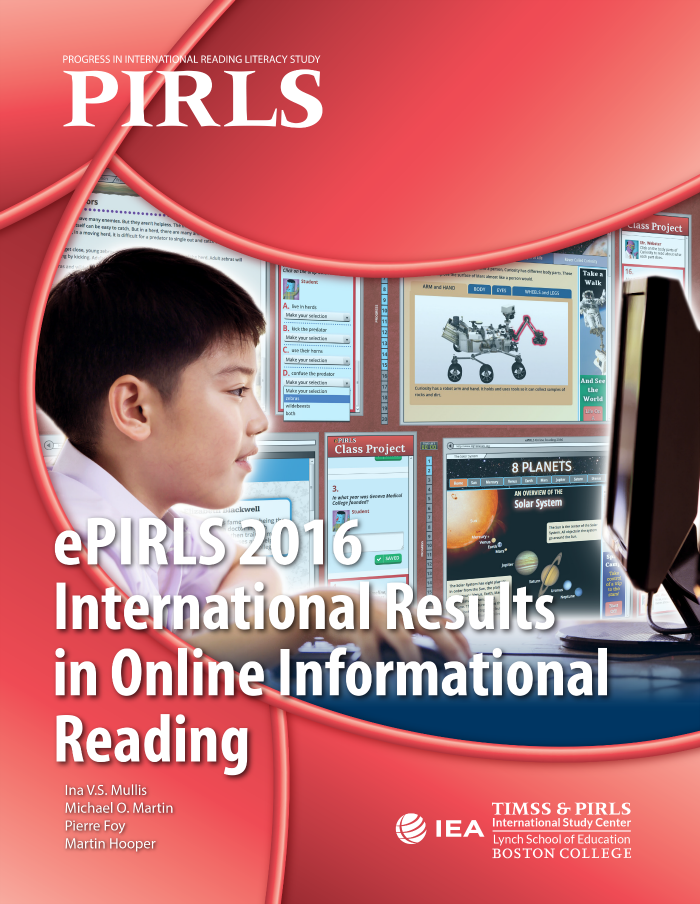ePIRLS 2016 International Results In Online Informational Reading

In 2016, IEA and its TIMSS & PIRLS International Study Center at Boston College conducted the inaugural ePIRLS assessment of online informational reading, as an extension of PIRLS. The ePIRLS 2016 International Results in Online Informational Reading includes four chapters providing numerous exhibits describing student achievement on ePIRLS compared to PIRLS overall and at the PIRLS 2016 International Benchmarks. Results also are presented in relation to students’ home and school contexts for learning to read online. The exhibits can be downloaded and printed from the Download Center.
The four chapters report on Student Achievement; Performance at the PIRLS International Benchmarks; Student Access and Experience With Digital devices; and Student Navigation Through ePIRLS.
ePIRLS, an innovative, computer-based assessment, uses an engaging, simulated Internet environment to present students with authentic school-like assignments on science and social studies topics. An Internet browser window provides students with a website containing information about their assignments, and students navigate through pages with a variety of features, including graphics, multiple tabs, links, pop-up windows, and animation. In an assessment window, a teacher avatar guides students through the assignments, prompting the students with questions about the online information.
ePIRLS 2016 and PIRLS 2016 continue the long tradition of international assessments conducted by IEA, the International Association for the Evaluation of Educational Achievement. IEA is an independent international cooperative of national research institutions and government agencies that has been conducting studies of cross-national achievement since 1959.
Copyright Notice
TIMSS and PIRLS are registered trademarks of IEA. Use of these trademarks without permission of IEA by others may constitute trademark infringement. Furthermore, the website and its contents, together with all online and/or printed publications and restricted use items by TIMSS, PIRLS, and IEA are and will remain the copyright of IEA.
All publications and restricted use items by TIMSS, PIRLS, and IEA, as well as translations thereof, are for non-commercial, educational, and research purposes only. Prior notice is required when using IEA data sources for assessments or learning materials. IEA reserves the right to refuse copy deemed inappropriate or not properly sourced.
Exploitation, distribution, redistribution, reproduction and/or transmitting in any form or by any means, including electronic or mechanical methods such as photocopying, information storage and retrieval system of these publications, restricted use items, translations thereof and/or part thereof are prohibited unless written permission has been provided by IEA.
When quoting and/or citing from one or more publications and/or restricted use items from TIMSS, PIRLS, and IEA for the sake of educational or research purposes, please print an acknowledgment of the source, including the year and name of that publication and/or restricted use item. Please use the following acknowledgment as an example:
SOURCE: ePIRLS 2016 International Results in Online Informational Reading. Copyright © 2017 International Association for the Evaluation of Educational Achievement (IEA). Publisher: TIMSS & PIRLS International Study Center, Lynch School of Education, Boston College.
Please note that citing without naming the source can or will constitute plagiarism for which you can and will be held accountable. To request permission to reuse, reproduce, or translate IEA material, please fill out the permission request form »
Disclaimer
Please note that the website and its contents, together with all online and/or printed publications and restricted use items (‘works’) by TIMSS, PIRLS, and IEA, were created with the utmost care. However, the correctness of the information cannot be guaranteed at all times and IEA cannot and will not be held responsible or liable for any damages that may arise from the use of these resources, nor will IEA be liable for the wrongful use and/or interpretation of its works.
Please be advised that IEA cannot authorize the use of texts or items that include third- party copyrighted materials (e.g., reading passages, photographs, images). Users of any third-party copyrighted materials must first seek and be granted copyright permission from the owner of the content as indicated in the copyright citation line.

